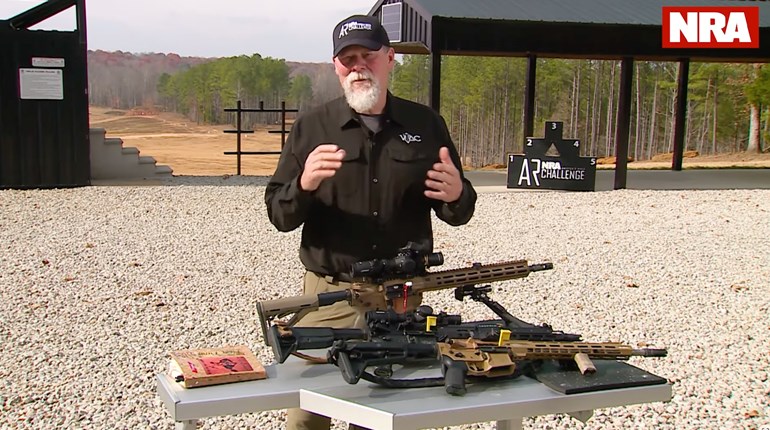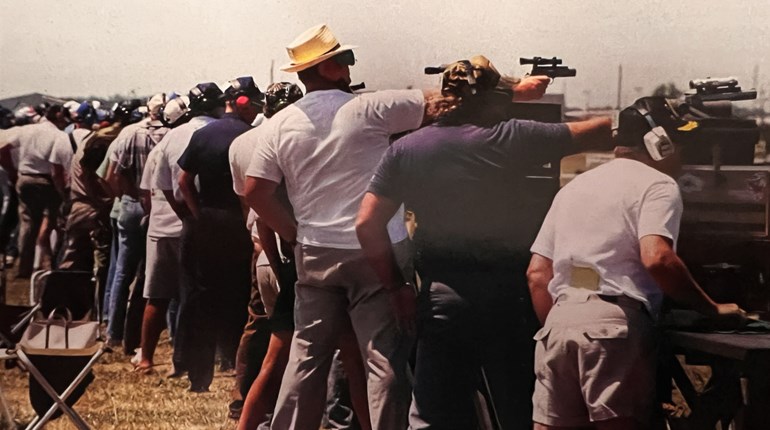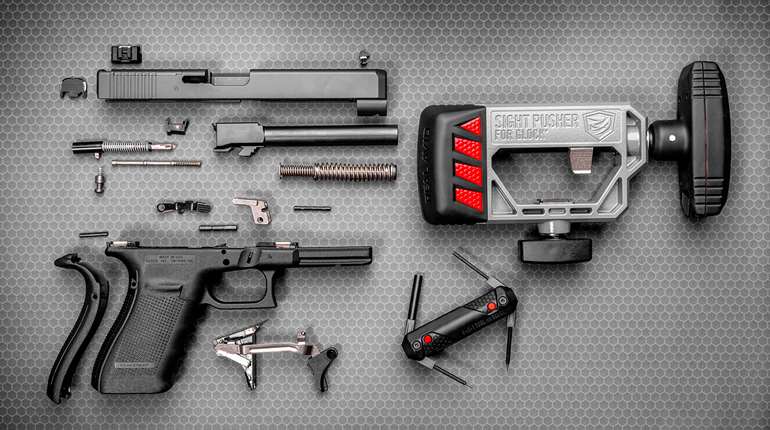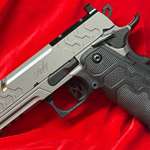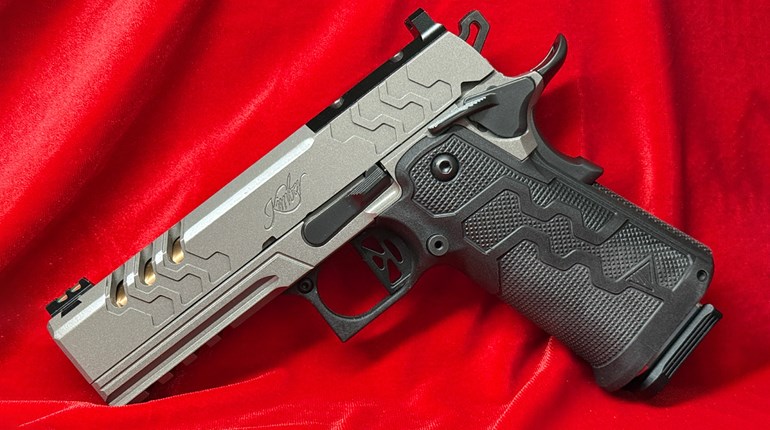
Annual NRA rule changes are posted online as updated rule book PDFs. To provide some background, we’ve included excerpts from the Competition Rules & Programs Committee report submitted to the NRA Board of Directors, as follows. For the current rulebooks, go to rulebooks.nra.org.
Action Shooting
Rule 10.15: Is regarding sentence lines 11-13, this rule change substitutes verbiage to state “The Starting position will be with the handgun holstered and the palms of both hands on the face of the Barricade”
Rule 3.2.0: Is regarding adding a Metallic sight rimfire firearm and use the Metallic Firearm sight rule minus the 1st sentence and replace first sentence with open rimfire firearm. NEW RULE 3.2.0 will move the first sentence from 3.11 “Any semi-automatic handgun or revolver chambered for .22 rimfire ammunition which is serviceable and safe.” This will also delete the first sentence to the semicolon in the rule book.
Rule 3.18.2: In rule 3.18.2 the word “will” is to be removed and verbiage stating “All original maunfacturers safety devices must functioned as designed” will be added.
Air Gun
Rule 3.2(a): Change this current rule to Adjust NRA time limits to match CMP time limits to simplify competitions for competitors who wish to compete in both types of match. Rule 3.2(a) will be changed in the Sporter and Precision Air Rifle Rulebooks to read: “Time Limits – The time allotted for sighting shots will be 8 minutes for the first set of targets or position, and 5 minutes for each set of targets or position thereafter. Record time is 1 minute per record shot prone and kneeling; and the following for standing:”
- 10 shots: 15 minutes
- 20 shots: 25 minutes
- 40 shots: 50 minutes
- 60 shots: 75 minutes
Rule 3.2(d): Within the Sporter Air Rifle Rulebook, change rule 3.2 (d) to read: “The butt plate may be adjustable.”
Rule 3.1 Figure 1 (D): Within the Precision Air Rifle Rulebook, under Rule 3.1 Figure 1 alter D to read: “Depth of fore-end in front of trigger guard: 120 mm (4.72 inches)”
Rule 3.1 Figure 1 (F): Within the Precision Air Rifle Rulebook, under Rule 3.1 Figure 1 alter F to read: “Lowest point of stock or toe butt plate: unlimited.”
Black Powder
The Arthur C. Jackson Trophy is to be repurposed and awarded to the NRA Black Powder Target Rifle National Champion. In the event that their ever is a World Black Powder Target Rifle Champion, with winner of the World Black Powder Target Rifle Championship will receive a picture of the Arthur C. Jackson and an award Certificate.
New Rule: Under Rule 17.5 add Rule 2.2.2 defining new category: “Grand Senior” Definition: A person may compete as a Grand Senior beginning on 01/01 of the calendar year in which their seventieth (70th) birthday occurs. This will conform with other shooting disciplines.”
New Rule: Add (the designation of) Rule 17.5 (aa) to the current National Championship Aggregate Course. This is a clerical motion as in the past the National Championship Aggregate Course was created by a motion that was passed but never assigned a (numerical) position in the BPTR rulebook, was not added to the 2017 National Match program and no medallion was provided.
New Rule: Add Rule 17.5 (p): 300 yds. SR-3 10 shots, 500 yds MR-65 10 shots, 600 yds. MR-1 10 shots. 30 shot mid range, any position then re-label current (p) through (y) as (q) through (z).
Collegiate
New Rule: For the “NRA All American Women’s Pistol Teams” The Collegiate Committee passed a motion to create a three person “First Team” and a three person “Second Team” for the NRA All American Women’s Pistol Team.
High Power Rifle
New Rule: 9.2 Sighting Shots – In Registered Tournaments, in which courses of fire are used that are listed under Rule 17.5, the sighting shots specified must be allowed.
a) Limited Sighting Shots – When limited sighting shots are allowed (see Rules 10.1.8 and 14.10(b)(3)) coaching will not be allowed.b) Unlimited Sighting Shots – When unlimited sighting shots are allowed the competitor may change rifles, and/or sights and receive coaching, before, but not after firing the first shot for record. No additional time will be allowed. In courses of fire in 20 shot 600 yard and 20 shot 1000 yard matches, the 800 yard stage of the Palma Course and any other match allowed by the match program, unlimited sighting shots may be allowed. See Rule 8.2(a) for time limitations.
c) In slow fire stages of matches where sighters are allowed, the shooters may or may not take their sighters, but must tell their scorer if they are not going to take sighters.
d) In rapid fire stages or matches, any sighting shots not fired during the time allowed for sighters will be recorded as misses (in the space reserved for sighting shots). See Section 8 for time allowance.
e) In slow fire stages where the match program allows convertible sighters, at the competitor’s option, he or she may elect to keep either the second sighter or the first and second sighter shots as record shots. If the competitor elects to take the first sighter, he or she must take the second sighter as a record shot. The competitor must make his or her intention clear to the scorer immediately after the sighters are fired and before any further record shots are fired. Coaching will not be allowed.
New Rule: 3.4 F-Class Rifle – Rule 3.4(a)(1) The rifle’s overall weight, including all attachments such as sights and bipod, must not exceed 10 kilograms (approximately 22 pounds). An “attachment” also includes any external object, other than the competitor and apparel, which recoils or partially recoils with the rifle, or which is clamped, held, or joined in any way to the rifle for each shot, or which even slightly raises with the straight vertical lifting of the rifle from its rest(s).
New Rule: Rule 3.1(c), sixth bullet point–metal or synthetic (polymer) magazines, standard issue or commercial equivalent, with standard service20 or 30-round box magazine dimensions must be attached during the firing of all courses and in all positions. A 10-round magazine with the extra external dimensions as a standard service 20-round box magazine maybe used. A dummy magazine with a ramp for single shot loading may be used if thismagazine has the same external dimensions as the standard service 20-round box magazine.
Rule change: Remove the Rules for the M1A Springfield Match from theAddendum (Page 80) of the High Power Rulebook and to add in its place as Addendum I –SPECIAL RANGE OPERATIONS below:
At the discretion of the Match Director, the following methods of range operations are permitted:
String Firing–Single competitor firing one shot at a time within the specified time limit. This may be accomplished in three or more relays with one competitor scoring and another operating the targets.
Two on a Firing Point–Two competitors on the firing point. Competitor A is on the right and competitor B is on the left. After competitor A fires a shot, competitor B scores that shot. Then competitor B fires a shot and competitor A scores for B, alternating in this way until each competitor has completed the required number of shots in that string or match.
Three on a Firing Point – With three competitors on the firing point, competitor A is positioned on the right, competitor B in the middle, and competitor A on the left. Competitor A fires and competitor C scores for A. Competitor B then fires and competitor A scores for B. Competitor C then fires and competitor B scores for C. This sequence is repeated until each competitor has completed the required number of shots in that string or match.
Squadded Firing – In individual matches, competitors are assigned to firing points in squads. Competitor A fires first and the last competitor in the squad is assigned scoring duties for the first competitor. While the competitor A is firing, competitor B is in preparation period. When competitor A completes the string, competitor A moves back off the firing line and competitor B moves to the firing line and begins to fire. Competitor A assumes scoring duties for competitor B. This rotation continued until all competitor have completed their strings. The Range Officer in charge of the target concerned will see that no competitor exceeds the time limit. The time each competitor commences firing will be noted on his or her scorecard and on the scoreboard if one is used. The Range Officer may move a competitor from one squad to another when another target has completed firing. (Squadded firing works best with dedicated target pullers/electronic targets and a large number of competitors.)
New Rule: The NRA Distinguished Rifleman Award can be earned only by participating in Regionals, State Championships and the National Championships. Four badges for all categories. A distinguished award bar will be issued with the badge as follows:
Type of Designation:
National Match Course (OTC)
a. Match Rifleb. Service Rifle
Mid-Range Distinguished
a. Target Rifleb. Palma Rifle
c. F-Class Rifle
Long Range Distinguished
a. Target Rifleb. Palma Rifle
c. Service Rifle
d. F-Class Rifle
Fullbore Distinguished
a. Palma Rifleb. F-Class Rifle
- Distinguished awards will be given for OTC, Mid-Range, Long Range and Fullbore. A shooter may earn distinguished awards in eleven categories. When the first bar is earned in a discipline, the Badge and the bar will be issued. When future bars are earned in that discipline, only the bar will be award.
- Award: A specially designed medallion, brassard, and lapel pin will be awarded to each individual who successfully completes the requirements for a Distinguished Badge.
- Steps: Each individual who attains a place in the top-scoring 10 percent of the competitors in each of the designed tournaments in which he participates will earn a step toward an NRA Distinguished Rifleman Award in the designated category. Designated tournaments are the National Championships, State Championships and Regionals. Each shooter who makes the same numerical score (X’s are not part of the numerical score) as the last score in the high 10 percent will be awarded a step toward Distinguished. a. Award of NRA Distinguished Rifleman: A shooter who earns a minimum of 4 steps in a designated category will be presented an NRA Distinguished Rifleman Award for that category under the following provisions.
i. Only a maximum of 2 steps for each type of Distinguished Award may be earned for official credit by a shooter during any one calendar year.
ii. All four steps may be earned in National Championship competition.
Distinguished – Course of Fire
National Match Course – Service Rifle/Match Rifle
Course of Fire – Rule 7.15 National/State/Regional Matches – Grand Aggregate
Mid-Range Conventional Prone – Target/Palma/F-Class Rifle
Course of Fire – National/State/Regional – Grand Aggregate
Long Range Conventional Prone – Target/Palma/F-Class Rifle
Course of Fire – State/Regional Matches – Grand Aggregate
Long Range Conventional Prone – Target Rifle
Course of Fire – National Matches – 800 Aggregate – Canadian Cup
Any sight 20 shots SF @ 1000 yds – Remington Trophy, Metallic sight 20 shots
SF@1000 yds – Mustin Trophy, Metallic sight 20 shots SF @ 1000 yds – Leach Cup Any sight – 20 shots SF @ 1000 yds – Wimbledon Trophy
Long Range Conventional Prone – Palma Rifle
Course of Fire – National Matches – 800 Aggregate – Sierra Trophy
20 shots SF @ 1000 yds – Remington Trophy, 20 shots SF @ 1000 yds – Mustin Trophy, 20 shots SF @ 1000 yds – Andrus Trophy, 20 shots SF @ 1000 yds – Doc Aiken Trophy
Long Range Conventional Prone – Service Rifle
Course of Fire – National matches – 800 Aggregate
20 shots SF @ 1000 yds – Remington Trophy, 20 shots SF @ 1000 yds – Mustin Trophy, 20 shots SF @ 1000 yds – Porter Trophy, 20 shots SF @ 1000 yds – Farr Trophy
Fullbore Prone – Palma/F-Class Rifle
Course of Fire – National/State Championships/Regional Matches 450 Aggregate
10 shots SF @ 300 yds, 10 shots SF @ 500 yds, 10 shots SF @600 yds, 15 shots SF @ 1000 yds
SR-6 Target MR-65 Target MR-1 Target LR Target
Long Range F-Class
Course of Fire – National/State Championships/Regionals Matches – 600 Aggregate
20 shots SF @ 1000 yds, 20 shots SF @ 1000 yds, 20 shots SF @ 1000 yds
LRFC Target
New Rule: Rule 3.1(e) - A temporary, fitted, non-adjustable cheek piece may be added for use on the service rifle when using optical sights.
New Rule: Rule 3.3.3(b) Sights – Telescopic sights, either fixed or variable, not to exceed 15x magnification. Standard metallic, holographic and other tactical sighting systems are also permitted. Laser sighting systems are prohibited.
New Rule: Rule 3.4.1(a) – The F-Open rifle may be supported by a front rest or bag, which may be fully adjustable for position but may not provide a positive mechanical method for returning the rifle to its prior point of aim from the previous shot. The rest may not mechanically capture the fore-end of the rifle in such a way that does not allow the rifle to be lifted directly up from the rest or to be placed directly down into the rest. Any rest which captures the fore-end of the rifle and that will not allow for the rifle to be lifted directly up from the rest shall be considered to be an attachment. The area of contact between the front bag and the rifle’s fore-end will not exceed 76mm x 76mm (2.99 inches x 2.99 inches). The F-Open front rest may be employed for either the rifle’s fore-end or for the shooter’s forward hand. If attached, clamped or held onto the rifle in any way, a front rest must be included in the rifle’s overall weight. The front rest may have up to three “feet”. Each “foot” may terminate in a spike, which may be pressed into the ground by up to 50 mm (about 2 inches), provided this causes no significant permanent harm or damage to the firing point.
These changes should also follow into the Fullbore Rulebook
Rule 3.4.1(a)(7) Deleted and (8) renumbered to be (7).
Rule 3.4.1(a)(8) – The contents of front and rear bags will be a dry, finely divided (less than 5mm/0.19”) granular substance such as, but not limited to, sand, gravel or grain, packed loosely enough so that the bag will be visibly deformable by pressure of the range officer’s fingers.
These changes should also follow into the Fullbore Rulebook
ELIGIBILITY AND CATEGORIES OF COMPETITIORS – TEAMS
Note: Team Composition: Teams may compete and be composed as follows:
a. 2 person teams – 2 firing members, one coach, one captain, on one targetb. 4 person teams – 4 firing members, one coach, one captain, on one target
c. 6 person teams – 6 firing members, one coach, one captain, on one target
d. 8 person teams – 8 firing members, 2 alternates, up to three coaches, one captain, on two targets
e. 12 person teams – 12 firing members, 2 alternates, up to three coaches, one captain, on two or three targets
f. 16 person teams – 16 firing members, 2 alternates, up to three coaches, one captain, on two or four targets
Precision Pistol
For the Distinguished Revolver Program competitions must occur only at National, Regional, and State Championship level matches.
Silhouette
(3.1.3) The name “Cowboy Lever Action Silhouette Rifle” shall be changed throughout the rule book to “Lever Action Silhouette Rifle” (dropping the word ‘Cowboy’).
(3.1.3.1) “Cowboy Lever Action Silhouette” shall be changed to “Lever Action Silhouette Rifle.”
(3.1.3.2) “Pistol Cartridge Cowboy Lever Action Silhouette” shall be changed to “Pistol Cartridge Lever Action Silhouette Rifle.”
(3.1.3.3) “Smallbore Cowboy Rifle Silhouette” shall be changed to ‘Smallbore Cowboy Silhouette Rifle’”.
These changes are name changes only and shall not reset National Records. The spirit of this motion is to disambiguate the family of Lever Action Silhouette from other sports while encouraging broader participation.












